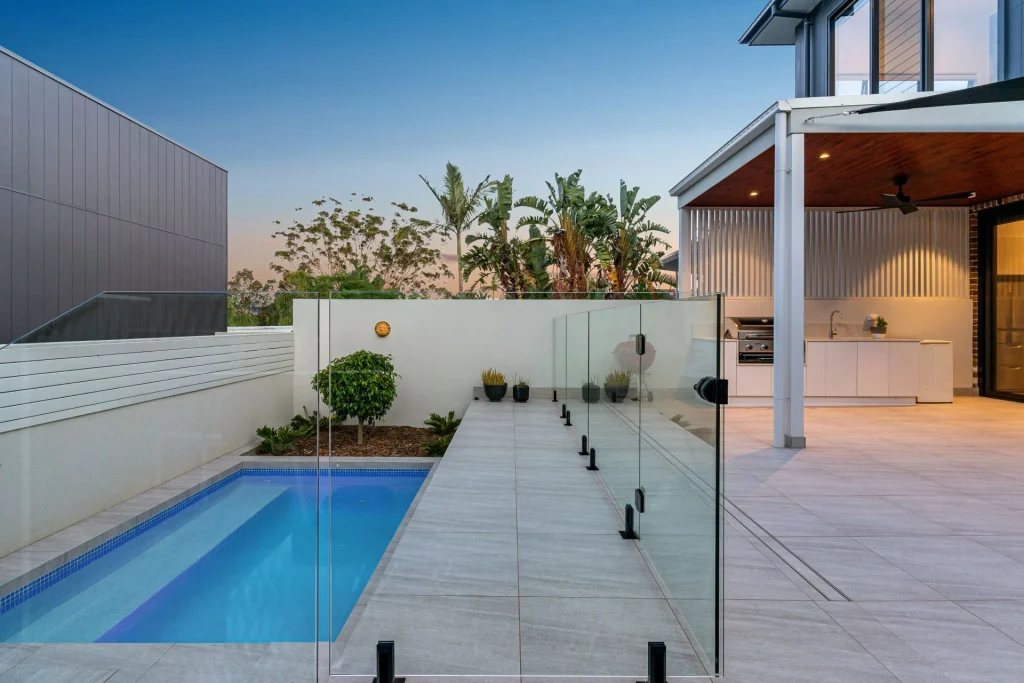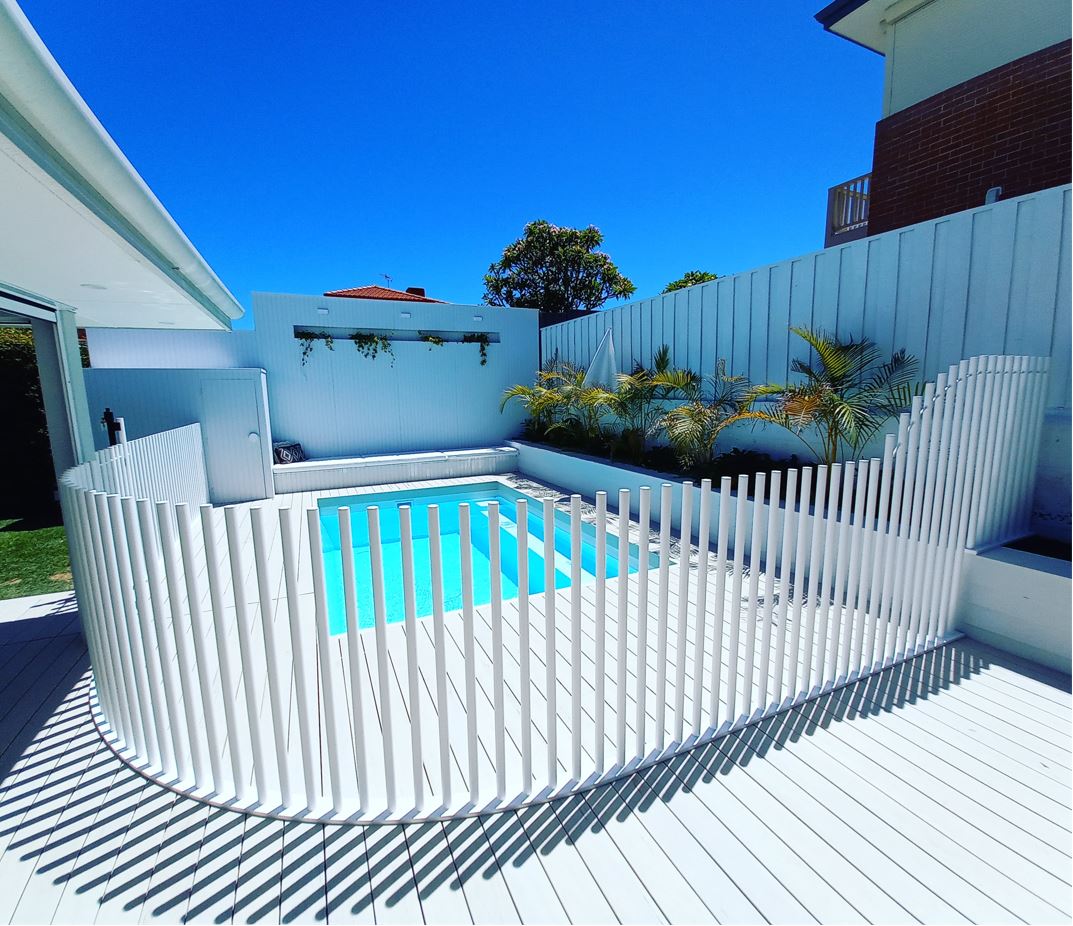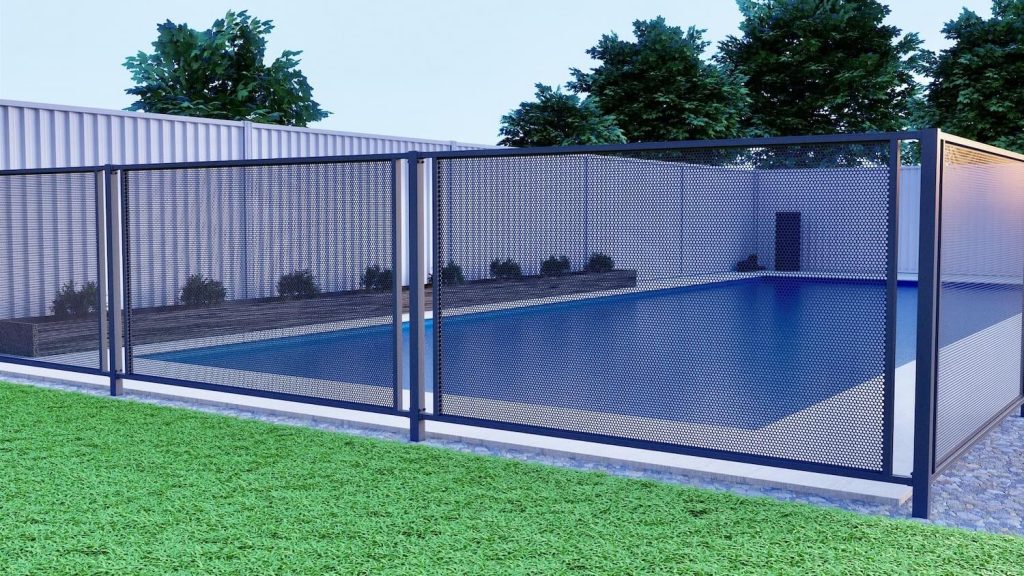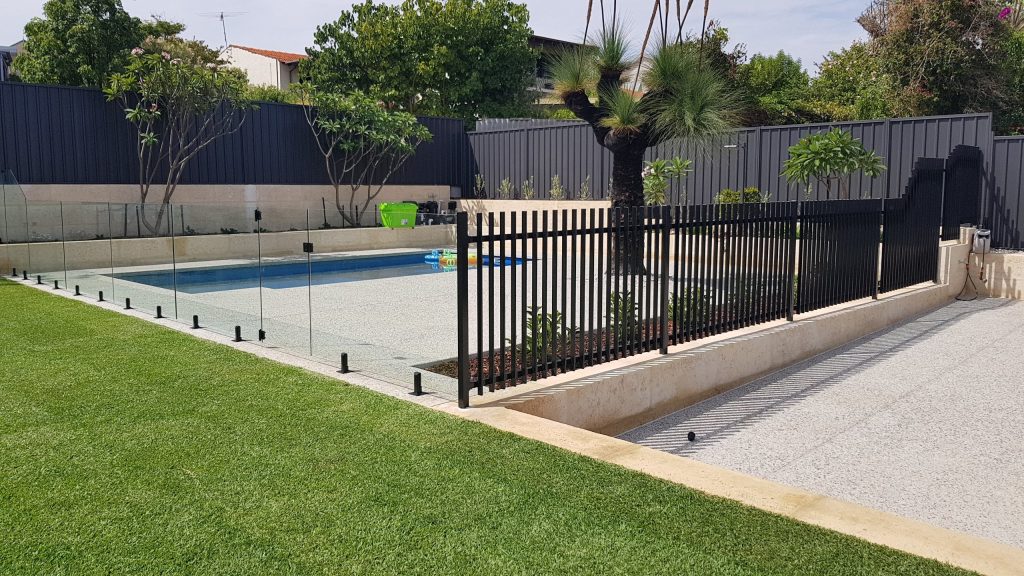
Selecting the right pool fencing for your Newcastle property is crucial for safety and aesthetics. As an experienced fencing contractor, I’ve worked on various residential and commercial pool fences. This guide will provide you with the insights you need to make an informed decision.
Table of Contents
- Introduction
- Safety Considerations
- Material Options
- Glass Fencing
- Aluminium Fencing
- Mesh Fencing
- Timber Fencing
- Vinyl Fencing
- Aesthetics and Design
- Budgeting and Costs
- Local Regulations in Newcastle
- Additional Features
- Summary

Introduction
Choosing the best pool fencing is crucial for ensuring safety while enhancing the aesthetics of your property. In Newcastle, pool fences are not only a legal requirement but also a vital component of your outdoor area, adding both functionality and style.
This guide explores essential aspects to consider, such as materials, safety, and local regulations related to Pool Fences, helping you make an informed choice tailored to your needs.
Safety Considerations
Safety is the most important factor when selecting pool fences, especially for households with young children or pets. Here are some key points to ensure safety.
- Height Compliance:
The fence must be at least 1.2 metres high to prevent children from climbing over.
Example: Installing a 1.5 metre glass fence can offer additional security while maintaining a sleek appearance. - Gap Restrictions:
Ensure no gaps are wider than 100 mm to prevent children or pets from squeezing through.
Example: Aluminium fences with vertical slats are designed to maintain consistent spacing that adheres to these standards. - Gate Mechanisms:
Gates must be self closing and self latching, ensuring they lock automatically after each use.
Example: Opt for magnetic latches like MagnaLatch®, designed for reliability in Australian weather conditions.
Material Options
A. Glass Fencing
- Pros:
- Provides an unobstructed view of the pool area, ideal for properties with scenic backdrops.
Example: Frameless glass panels are perfect for modern homes overlooking Newcastle’s coastline. - Highly durable and resistant to weathering, including salt spray in coastal regions.
- Provides an unobstructed view of the pool area, ideal for properties with scenic backdrops.
- Cons:
- Generally more expensive than other materials, with installation costs potentially higher.
- Requires regular cleaning to prevent watermarks and fingerprints from accumulating.
B. Aluminium Fencing
- Pros:
- Affordable and low maintenance, making it a cost effective option for many families.
- Resistant to rust and corrosion, suitable for Newcastle’s humid and coastal climate.
- Cons:
- Does not provide complete privacy, as it is typically designed with open slats.
- Offers a functional rather than decorative appearance, which may not suit all styles.
C. Mesh Fencing
- Pros:
- Lightweight and removable, ideal for temporary use or rental properties.
- Affordable, with a transparent design that maintains visibility around the pool.
- Cons:
- Less durable than other options and prone to wear over time.
- Lacks the aesthetic appeal of more permanent materials like glass or timber.
D. Timber Fencing
- Pros:
- Offers a natural, rustic charm and can be customised with paint or stain to match your home.
Example: Hardwood timber fences stained in a natural oak finish blend seamlessly with garden landscapes. - Solid designs provide privacy, perfect for pools close to neighbouring properties.
- Offers a natural, rustic charm and can be customised with paint or stain to match your home.
- Cons:
- Requires regular treatment to protect against rot, termites, and weather damage.
- May warp or fade over time if not adequately maintained.
E. Vinyl Fencing
- Pros:
- Durable and low maintenance, withstanding harsh weather without rotting or peeling.
- Available in a variety of colours and designs to suit different architectural styles.
- Cons:
- Higher upfront costs compared to timber or aluminium.
- Some homeowners may find it lacks the warmth or character of natural materials.

Aesthetics and Design
The design of your pool fences should complement your home and garden while maintaining its functionality.
- Consider Colour and Style:
Match your fence to your home’s exterior. Neutral tones like black or grey can suit modern homes, while natural wood tones may work for traditional settings.
Example: A frameless glass fence with a brushed stainless steel base creates a luxurious, minimalist look. - Blend with Landscaping:
Incorporate materials that harmonise with your garden.
Example: Use timber fencing around a pool surrounded by native plants to achieve a cohesive natural theme.
Budgeting and Costs
Balancing upfront costs with long-term maintenance of pool fences is key to managing your budget effectively.
- High Initial Costs but Low Maintenance:
Materials like glass and vinyl have higher installation costs but require minimal upkeep.
Example: A glass fence costing $300 per metre might save you money over time due to its durability. - Lower Initial Costs but Higher Maintenance:
Materials like timber are cheaper to install but may require frequent repairs or replacements.
Example: A timber fence costing $150 per metre may need annual treatment costing $50 per panel.
Local Regulations in Newcastle
Compliance with local regulations is mandatory to ensure the safety and legality of your pool fences.
- Key Requirements:
- Fences must meet the Building Code of Australia (BCA) standards, including minimum height and gate specifications.
- Gates should swing outward from the pool area and automatically latch when closed.
- Regular inspections may be required by Newcastle City Council to ensure ongoing compliance.
Example: Installing a compliant aluminium fence with self closing gates ensures peace of mind during council inspections.

Additional Features
Enhance your pool fences with additional features to improve functionality and aesthetics.
- Reliable Locking Mechanisms:
Invest in high quality locks to enhance security.
Example: Keyless entry locks with PIN codes add convenience and safety. - Decorative Elements:
Consider built in lighting or intricate designs to elevate your outdoor space.
Example: LED strip lighting along a glass fence base creates a stunning night time effect.
Summary
Selecting the right Pool Fences in Newcastle involves finding the right balance between safety, aesthetics, and cost. By exploring options like glass, aluminium, mesh, timber, and vinyl Pool Fences, you can choose a solution that meets your practical needs and aligns with your style preferences. Always ensure your Pool Fences comply with local regulations for a secure and beautiful pool area.

Why Choose Our Business?
- Experience: Over 20 years in the fencing industry with a focus on both residential and commercial projects.
- Quality Materials: We use only the best materials to ensure durability and safety.
- Custom Designs: Tailored fencing solutions to match your unique requirements.
- Compliance: All our installations meet Newcastle’s local regulations.
- Customer Service: Dedicated support and free quotes to help you make the best decision.
Contact us today for more details or to request a free quote. Your safety and satisfaction are our top priorities.
FAQs
In Australia, pool fences must be at least 1.2 metres high to comply with safety regulations under Australian Standard AS1926.1-2012. This height ensures that children cannot climb over the fence easily, reducing the risk of accidents. Additionally, gaps between the ground and the bottom of the fence cannot exceed 100mm, and the fence itself must not have footholds that could aid climbing. Double checking with your local council is a good idea, as they may have additional or specific requirements.
For coastal areas, durability and resistance to salt corrosion are key. Powder-coated aluminium is a top choice due to its lightweight nature, rust resistance, and low maintenance. Stainless steel is also excellent but requires a marine-grade quality like 316 stainless steel to withstand the salty air. Glass fencing with stainless steel or aluminium supports is another stylish and durable option, providing clear views of the pool while being resistant to corrosion. Whatever material you choose, regular cleaning and maintenance will help extend its lifespan in the harsh coastal environment.
Timber fencing around a pool requires maintenance every 1–2 years to protect it from weathering, especially in areas exposed to high moisture, sun, or salty air. This involves cleaning, sanding, and applying a protective sealant, oil, or stain to prevent rot, cracking, and fading. In coastal areas or wetter climates, you might need to inspect and treat the timber more frequently to ensure it remains structurally sound. If you notice signs of damage or decay, addressing them promptly will help extend the life of the fence.
Yes, pool fences in Newcastle must adhere to the New South Wales Swimming Pools Act 1992 and comply with the Australian Standard AS1926.1-2012. Regulations include a minimum fence height of 1.2 metres, proper gate latching mechanisms, and ensuring that the fence is non-climbable. Additionally, any pool deeper than 300mm must be fenced, and gates must be self-closing and self-latching. It’s also mandatory to have your pool fence inspected and certified by a licensed certifier to ensure compliance with safety laws. Contact the Newcastle City Council for detailed requirements and guidance.
Yes, you can install a pool fence yourself, but it must meet all safety and legal standards to pass an inspection. DIY installation requires careful attention to details like fence height, gap measurements, and the positioning of gates. Keep in mind that even minor errors, such as a gate that doesn’t self-close properly, could lead to non-compliance or safety risks. If you’re not confident in meeting these requirements, hiring a professional ensures the fence is installed correctly and hassle-free.
Beyond the basics, adding features like self-closing and self-latching gates is essential for safety. Consider using frosted or tinted glass for privacy or decorative metal panels to enhance the aesthetic appeal of your pool area. Integrated lighting along the fence can improve safety at night and add ambiance. You might also look into child-proof locking systems and non-climbable landscaping near the fence to further enhance security. For convenience, think about designing access points that are easy for adults but secure against accidental entry by children.
To clean glass pool fencing, use a bucket of warm water mixed with a mild dishwashing detergent or glass-safe cleaner and a soft cloth or sponge to gently scrub the surface. For tough stains like water spots or salt residue, a 50/50 solution of water and vinegar works well. Rinse thoroughly with clean water to prevent streaks and wipe dry with a microfiber cloth. For best results, clean the glass every 1–2 weeks, especially in coastal areas, to prevent build-up of grime and maintain its pristine appearance. Regular cleaning also helps preserve the protective coatings applied to the glass.

